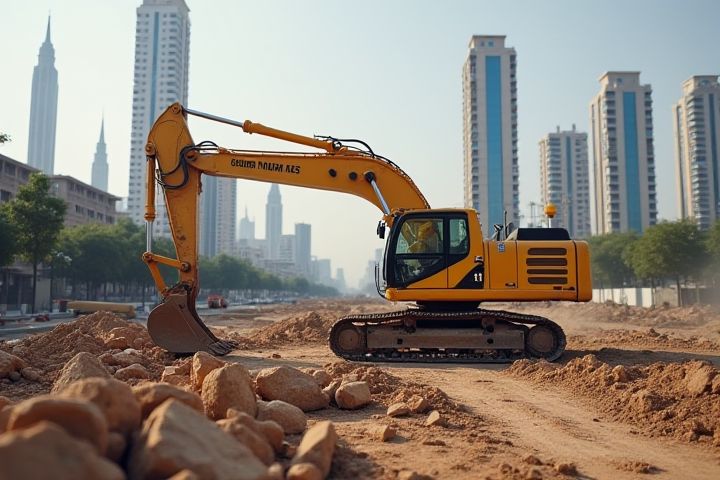
Construction projects in Nigeria are pivotal for the nation's infrastructure development, driving economic growth and creating job opportunities. The Nigerian government has emphasized public-private partnerships (PPPs) to enhance funding for critical projects, such as road networks, bridges, and housing developments. Major cities like Lagos and Abuja showcase ambitious real estate initiatives, including high-rise commercial buildings and luxury residential complexes, reflecting the country's urbanization trends. Sustainable building practices are gaining momentum, with an increasing focus on green construction techniques to minimize environmental impact. For investors, the construction sector offers significant opportunities, fueled by ongoing urban expansion and government initiatives to modernize infrastructure.
Regulatory compliance
Construction projects in Nigeria emphasize regulatory compliance to ensure adherence to national and local laws regarding safety standards, environmental impact, and building codes. Key regulatory bodies, such as the Federal Ministry of Works and Housing and the Nigerian Building and Road Research Institute, play crucial roles in overseeing project approvals and inspections. By prioritizing compliance, developers not only mitigate risks associated with legal penalties but also enhance the overall quality and safety of infrastructure. You can ensure project success by understanding the specific regulations that govern the area where your construction is taking place.
Environmental challenges
Construction projects in Nigeria increasingly prioritize addressing environmental challenges, such as deforestation and soil erosion, which adversely affect ecosystems and communities. Sustainable building practices are gaining traction, emphasizing the use of eco-friendly materials and energy-efficient designs to minimize environmental impact. Regulatory frameworks are evolving, encouraging developers to implement sustainable construction methods that comply with environmental standards. By considering these factors, you support a more resilient infrastructure that balances growth with environmental preservation.
Labor and employment laws
In Nigeria, construction projects must navigate a complex framework of labor and employment laws designed to regulate workforce conditions and ensure fair labor practices. These laws cover essential aspects such as minimum wage requirements, occupational health and safety standards, and employee rights, promoting a safer working environment for construction workers. The Federal Ministry of Labour and Employment enforces compliance, while various labor unions advocate for the rights of workers in the industry. As an employer or contractor, understanding these legal obligations is critical for the successful and lawful execution of construction initiatives.
Infrastructure development
In Nigeria, infrastructure development encompasses the construction of roads, bridges, and transportation networks, which are essential for economic growth and connectivity. Urban areas benefit from enhanced public facilities, including schools and hospitals, contributing to improved quality of life for residents. The government, alongside private investors, actively participates in funding initiatives to address the country's infrastructure deficit. By prioritizing these projects, Nigeria aims to stimulate job creation and attract foreign investment, ultimately fostering a more resilient economy.
Cultural considerations
In Nigeria, construction projects profoundly integrate cultural considerations to ensure community acceptance and sustainability. Key factors include the choice of architectural styles that reflect local traditions and the use of indigenous materials that resonate with regional identities. Engaging local artisans fosters a sense of ownership and pride within communities, which is crucial for the long-term success of these developments. By prioritizing cultural sensitivity, projects not only enhance aesthetic value but also promote social cohesion, ultimately contributing to economic growth.
Financing and funding options
Construction projects in Nigeria increasingly prioritize diverse financing and funding options to meet growing infrastructure demands. Innovative public-private partnerships (PPPs) create pathways for investment, enhancing project viability and sustainability. Government incentives and regulations, such as tax breaks for infrastructure developers, further attract both local and foreign investors. Understanding these financing mechanisms can significantly influence your project's success in this dynamic market.
Technological advancements
Construction projects in Nigeria increasingly integrate technological advancements, enhancing efficiency and sustainability in the industry. Innovations such as Building Information Modeling (BIM) and drone surveying streamline project management and improve accuracy in planning. The adoption of green building materials and practices is gaining traction, promoting environmental responsibility and energy efficiency. By harnessing these technologies, construction firms are better positioned to meet the growing demand for infrastructure while navigating challenges like urbanization and resource scarcity.
Safety standards
Construction projects in Nigeria are increasingly emphasizing safety standards to protect workers and ensure compliance with regulations. The Nigerian Building and Road Research Institute (NBRRI) provides guidelines aimed at minimizing accidents and promoting a culture of safety on construction sites. Implementing proper safety protocols, such as personal protective equipment (PPE) and regular safety training, significantly reduces risks associated with construction activities. By prioritizing safety, stakeholders can improve project efficiency and meet international standards, enhancing Nigeria's reputation in the global construction industry.
Local sourcing and materials
Construction projects in Nigeria prioritize local sourcing, emphasizing the use of indigenous materials to bolster the economy. This approach not only reduces transportation costs but also supports local artisans and craftsmen, fostering community development. Sustainable practices are increasingly adopted, utilizing renewable resources like bamboo and laterite, which are abundant in the region. By promoting local supply chains, Nigerian construction initiatives aim to enhance efficiency and sustainability while minimizing environmental impacts.
Government policies and incentives
Construction projects in Nigeria heavily depend on government policies and incentives that shape the industry landscape. The Nigerian government has introduced various strategies, such as tax holidays and reduced import duties on construction materials, to stimulate growth and attract foreign investment. Such policies not only enhance infrastructure development but also create job opportunities and improve living standards for local populations. Understanding these factors is crucial for stakeholders aiming to navigate the complexities of the Nigerian construction market effectively.
